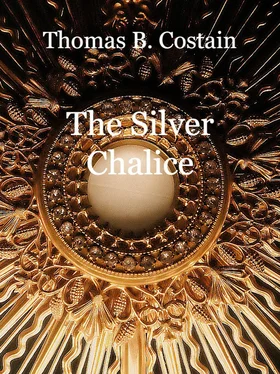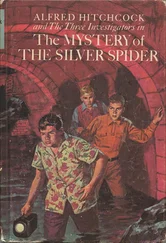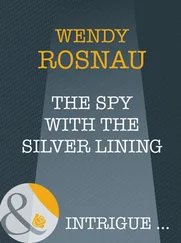Thomas B. Costain - The Silver Chalice
Здесь есть возможность читать онлайн «Thomas B. Costain - The Silver Chalice» — ознакомительный отрывок электронной книги совершенно бесплатно, а после прочтения отрывка купить полную версию. В некоторых случаях можно слушать аудио, скачать через торрент в формате fb2 и присутствует краткое содержание. Жанр: unrecognised, на английском языке. Описание произведения, (предисловие) а так же отзывы посетителей доступны на портале библиотеки ЛибКат.
- Название:The Silver Chalice
- Автор:
- Жанр:
- Год:неизвестен
- ISBN:нет данных
- Рейтинг книги:5 / 5. Голосов: 1
-
Избранное:Добавить в избранное
- Отзывы:
-
Ваша оценка:
- 100
- 1
- 2
- 3
- 4
- 5
The Silver Chalice: краткое содержание, описание и аннотация
Предлагаем к чтению аннотацию, описание, краткое содержание или предисловие (зависит от того, что написал сам автор книги «The Silver Chalice»). Если вы не нашли необходимую информацию о книге — напишите в комментариях, мы постараемся отыскать её.
The Silver Chalice — читать онлайн ознакомительный отрывок
Ниже представлен текст книги, разбитый по страницам. Система сохранения места последней прочитанной страницы, позволяет с удобством читать онлайн бесплатно книгу «The Silver Chalice», без необходимости каждый раз заново искать на чём Вы остановились. Поставьте закладку, и сможете в любой момент перейти на страницу, на которой закончили чтение.
Интервал:
Закладка:
Whether Basil would have persuaded himself to the need of bribing the magistrates and the one important witness, as Quintus Annius had advised, was something he would never know himself. Linus, the brother of the dead merchant, had moved too fast. While the heir still debated the issue in his mind, rebelling at the dishonesty of it, the taurine brother had brought his action, claiming that he, Basil, was not an adopted son.
It had required no more than one glance at the face of Marius Antonius, who was called in the city the Bottomless Pocket, to convince the rightful heir that he had made a mistake. The magistrate was bitter and biting to him but affable to the plaintiff. He had shown himself from the first to be biased, directing the questions and prompting the witnesses when they seemed unsure of their answers. He had snapped off any tendency to give evidence friendly to the son of the house.
Hiram of Silenus was as unsatisfactory as a witness as the secretary had predicted. He remembered little, and everything he said was hostile to the son’s claim. The brass scales had not been struck by the ingot of lead and so he was certain that the transaction he witnessed had not been an adoption. Acquaintances of the dead Ignatius testified that he had made no effort to put authority of any kind in the hands of the man who claimed to be his adopted son and that the position of the latter had seemed to be that of a beneficiary being supported while he developed his talents. Men in trade reported their impressions of the relationship, always unfavorable to Basil. Persis had not been allowed to attend and, when Quintus Annius did not appear, Basil’s hopes expired. The young Roman, it seemed, had preferred at the last to consult his own interests.
Basil knew that his father had intended to summon a panel of witnesses and to acknowledge before them that he, Basil, was his adopted son. Because Ignatius had died too soon, it was now necessary to stand in court in front of a corrupt judge and listen to an unctuous statement of the decision.
He reached the street, where the sun blazed down on the white walls of the great buildings. “This is a world of cruelty and dishonesty,” he said to himself, staring tautly at the crowds which passed along the Colonnade. “I, who should have been the richest man in Antioch, am now a slave. I own nothing and I have no rights in life.”
Persis had dressed herself in the expectation of a rightful verdict. Over the intimate undergarment, which was white and sleeveless and of cool linen, she had draped her gayest palla. It was of Tyrian purple, the most prized of colors and the only one which aided her fading charms. Her hair had been curled and plaited and she wore a wreath of gold with precious stones in each leaf, the last gift of her uxorious husband.
But when she trailed her long draperies across the marble floor of her room to meet Basil on his return, her attire had fallen into sad disorder. Her hair hung on her forehead in straight, damp wisps. Her face looked wrinkled and thin.
“My poor boy, my poor boy!” she whispered, pressing her clenched knuckles to her lips. “What will become of you now? What—what will become of me?”
“I would have been a failure, Mother, as the head of the family.” Basil paused and achieved a feeble smile. “I must not call you that again. The court has ruled I am not your son.”
“You are my son!” She seemed to have taken fire at last. Her eyes lost their listlessness; she reached out to place a possessive hand on his shoulder. It was no more than a passing phase, and almost immediately she lapsed again into a mood of resignation. “He always resented you,” she said in a low voice, as though afraid of being heard by other ears. “I could see it in his face. He intended to do this from the very first. Prying into the books and bribing the servants!” Her eyes were now filled with tears of self-pity. “He hated me because I complained to my husband of him once. Basil, Basil, is there nothing you can do to help us both?”
The dispossessed heir looked down at her with burning eyes. “Not immediately, Mother. Linus has won. He will be master here.” His hands were so tightly clenched at his sides that he could feel the nails cut into his skin. “But I haven’t given up hope, Mother. I am going to fight him. There is still one chance. I shall go on fighting him if—if they kill me for it!”
Persis was weeping loudly now. “Oh, why did my husband leave things like this? He was so careful about everything else. Ignatius, come back to your distracted wife and the son who has been robbed of his rights, and tell us what we should do!”
Basil was conscious of eyes on his back as he descended the stairs to the main floor and of anxious faces peering at him from around corners and out of darkened doorways. The silence of intense fear hung over the slave quarters. Castor met him in the lower hall, resentment in every line of his squat figure.
“He has come, stamping on his heels as though he owned everything,” he said. “It was different once! He would come to me then and whisper out of the corner of his mouth, ‘Help me in this, Castor,’ or ‘Get me those papers which came from the warehouses today when my brother is through with them.’ He was like a cat with butter on his paws. When he came in just now, he stared at me and gave that grunt of his. ‘You will be taking my orders, O once mighty Castor,’ he said. ‘Put away that whip because I am going to rule by the bastinado. How sensitive are the soles of your feet, my Castor?’ ” The major-domo stopped abruptly, as though realizing the danger to which he might be exposing himself with his frankness. He nodded to Basil in as friendly a manner as he dared assume. “You are wanted at once.”
The new head of the gens was sitting in his brother’s chair when the dispossessed heir entered the circular room. His head, which had once been covered with a thatch of tight-curling reddish hair, had been shaved as a sign of mourning, and it had something of the look of a ripe squash. Because of the heat of the day he had drawn the skirt of his tunic up around his hips, and his fat bare legs were spread out in front of him. There was a triumphant and malicious glitter in his pinkish-red eyes.
“You have been sold,” he announced. “To Sosthene of Tarsus, the silversmith.”
Basil had been expecting some such announcement and he was not much disturbed. Being sent back to the Ward of the Trades might be better than remaining here. He could detect sounds of activity in the room back of him, which the secretary occupied. “Quintus has lost no time in changing sides,” he thought. “I wish him joy of his new master.” He was fully aware, nevertheless, that the fault did not rest on the shoulders of that capable young Roman but on his own.
“This knack of yours”—there was a slighting edge to the voice of Linus—“gave you some small value. I drove as good a bargain as I could, but in spite of that I got little enough for you. You will go to your master at once. I don’t want you here a moment longer than is necessary, so be on your way, my once proud Ambrose, son of the laziest seller of pens in all Antioch.”
“The Romans would crucify me it I killed him now,” said Basil to himself. “I must swallow everything he says—and wait.”
“You understand, don’t you, that you have no possessions now? Take nothing with you but the clothes you wear. I would strip you to the skin and send you on your way in sackcloth, but if I did there would be people to find fault with me. The tools you used and the trinkets you made are no longer yours. They belong here. They have been collected and put away.”
“They are mine!” Basil looked up at the new master of the household for the first time. “I know something of the law and I can prove——”
Читать дальшеИнтервал:
Закладка:
Похожие книги на «The Silver Chalice»
Представляем Вашему вниманию похожие книги на «The Silver Chalice» списком для выбора. Мы отобрали схожую по названию и смыслу литературу в надежде предоставить читателям больше вариантов отыскать новые, интересные, ещё непрочитанные произведения.
Обсуждение, отзывы о книге «The Silver Chalice» и просто собственные мнения читателей. Оставьте ваши комментарии, напишите, что Вы думаете о произведении, его смысле или главных героях. Укажите что конкретно понравилось, а что нет, и почему Вы так считаете.












